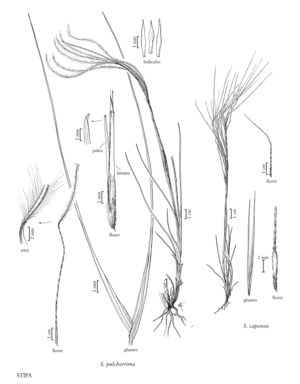Difference between revisions of "Stipa pulcherrima"
FNA>Volume Importer |
FNA>Volume Importer |
||
| Line 36: | Line 36: | ||
|publication year= | |publication year= | ||
|special status= | |special status= | ||
| − | |source xml=https://jpend@bitbucket.org/aafc-mbb/fna-data-curation.git/src/ | + | |source xml=https://jpend@bitbucket.org/aafc-mbb/fna-data-curation.git/src/f6b125a955440c0872999024f038d74684f65921/coarse_grained_fna_xml/V24/V24_210.xml |
|subfamily=Poaceae subfam. Pooideae | |subfamily=Poaceae subfam. Pooideae | ||
|tribe=Poaceae tribe Stipeae | |tribe=Poaceae tribe Stipeae | ||
Revision as of 19:14, 24 September 2019
Plants perennial; cespitose, not rhizomatous. Culms 40-100 cm, glabrous or pubescent below the panicles. Sheaths longer than the internodes, smooth, mostly glabrous, margins sometimes ciliate; ligules 0.5-2 mm on the innovations, to 9 mm on the cauline leaves, stiffly membranous, pubescent, entire to erose; blades 2-5 mm wide when flat, 0.3-0.9(1.5) mm in diameter if involute, abaxial surfaces glabrous, smooth or scabrous, adaxial surfaces glabrous, scabrous, or hirsute, hairs to 0.6 mm. Panicles 10-15 cm, contracted, usually partially enclosed in the upper sheath; branches appressed to ascending, with 1-4 spikelets. Glumes 60-80(90) mm, long-attenuate, mostly hyaline; florets (18)20-27 mm; calluses 3-6 mm; lemmas with lines of hair over the veins and marginal veins, lines over the marginal veins longest, extending to the lemma apices; awns (250)300-500 mm, twice-geniculate, first 2 segments glabrous or hairy, hairs to 2 mm, terminal segment plumose, hairs 5-6 mm, spreading; paleas subequal to the lemmas, usually hairy on the keels, apices scarious; anthers 5-10 mm, not penicillate, yellowish or purplish; styles 2. Caryopses 10-18 mm. 2n = 44.
Discussion
Stipa pulcherrima is native from France and Germany to Armenia, Azerbaijan, Turkey, and Iran. Freitag (1985) regarded it as a subspecies of S. pennata L. Its long, plumose awns make it a striking ornamental.
Selected References
None.
